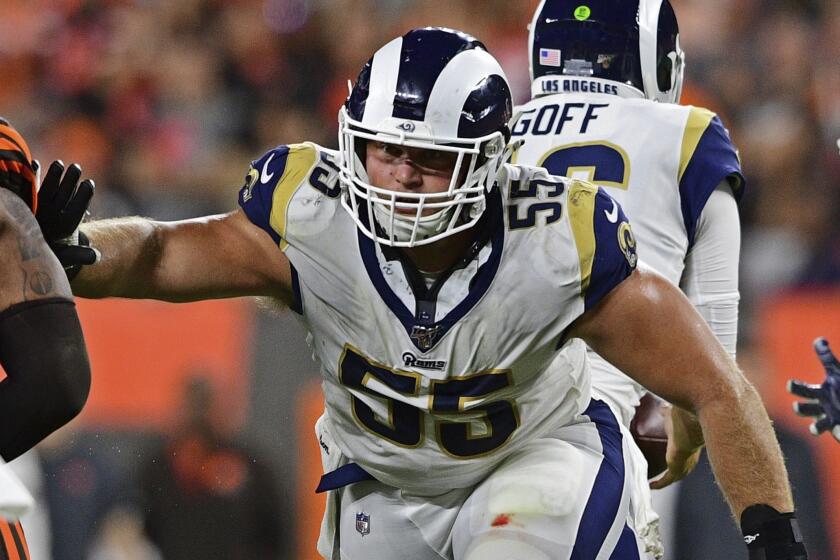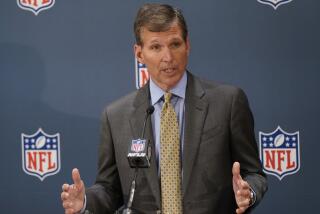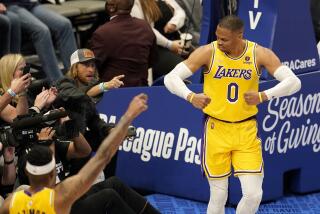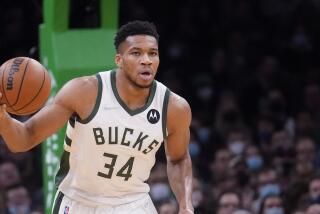Is bringing back sports during coronavirus realistic or safe? We asked the experts
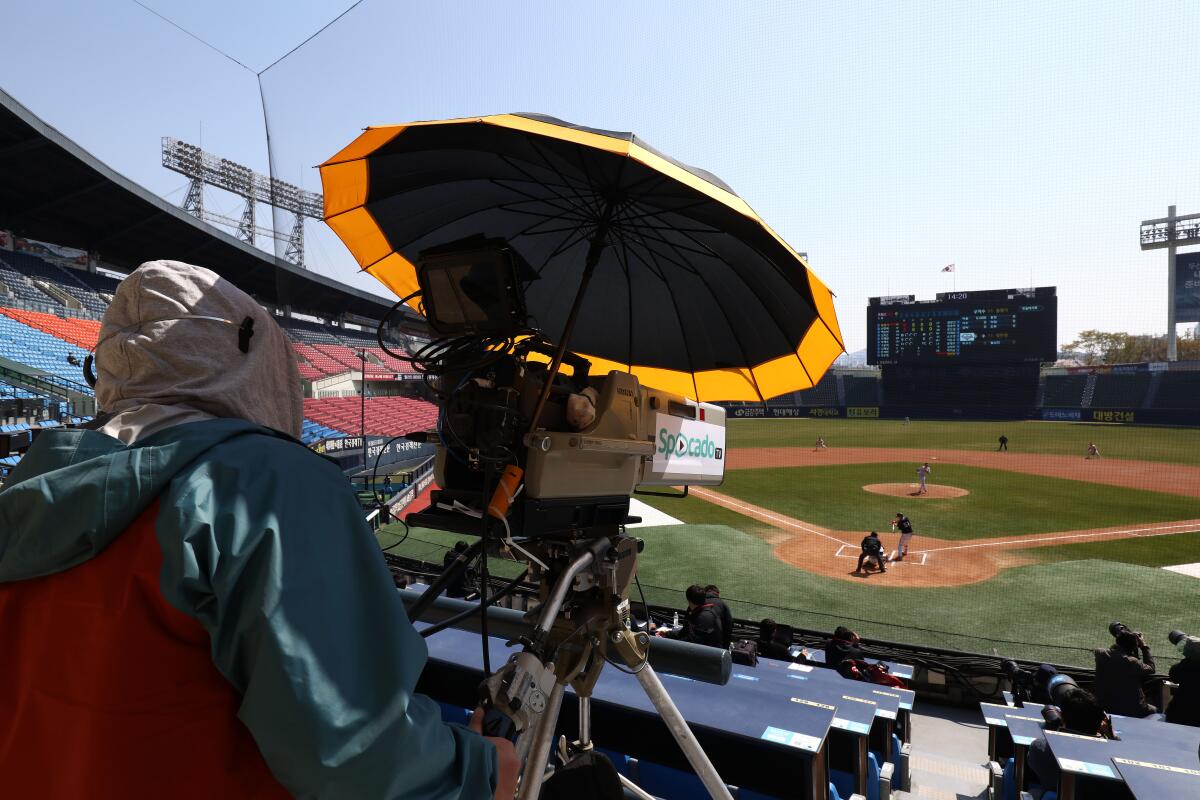
- Share via
Football has been on Larry Chang’s mind the last few days. He cannot help thinking about his Baltimore Ravens and the return of games this fall.
“I’m a huge NFL fan,” he said, musing about the team’s star quarterback. “I want to see Lamar Jackson back on the field.”
But as an infectious disease specialist at Johns Hopkins School of Medicine, in the city where the Ravens play, Chang asks an important question: “Is that realistic?”
There has been a lot of talk about the return of sports to a nation yearning for some hint of normalcy amid the coronavirus pandemic.
Major League Baseball has discussed quarantining all 30 of its teams in Arizona, keeping players, coaches and staff in a virus-free BioDome facsimile and holding games in empty ballparks. The Ultimate Fighting Championship reportedly has scheduled bouts on tribal land in Central California, and its president, Dana White, has floated the idea of staging subsequent bouts on a sequestered island.
Even President Trump has weighed in, envisioning packed grandstands in late summer, saying, “I want fans back in the arenas.”
But Chang isn’t the only one who worries about resuming play, even with no spectators. He and other public health experts fear it would be a risky proposition if the outbreak persists or, as some expect, recedes during summer and reappears in fall.
“I would be very nervous about having any sports, whether it’s football or basketball or even baseball,” said Dr. Richard Jackson, a former CDC official and professor emeritus at UCLA’s Fielding School of Public Health.
Jackson dismisses the idea that professional athletes, young and fit, hold some kind of “get out of jail free card” when it comes to the coronavirus.
“This is not just the plain-old flu,” he says.
::
Setting aside any qualms about sports in a time of pandemic — the example it might set for a populace asked to shelter in place, the use of scarce testing resources on otherwise healthy, millionaire athletes — fans might be tantalized by recent news from South Korea.
As widespread testing flattens the curve of reported cases in that country, pro baseball has resumed training and intrasquad scrimmages, with the Korean Baseball Organization’s 10 teams inching toward an opening day next month.
Players are constantly checked for symptoms and body temperature. Stadiums remain shuttered. Even one reported case of COVID-19 could bring the experiment to an abrupt halt.
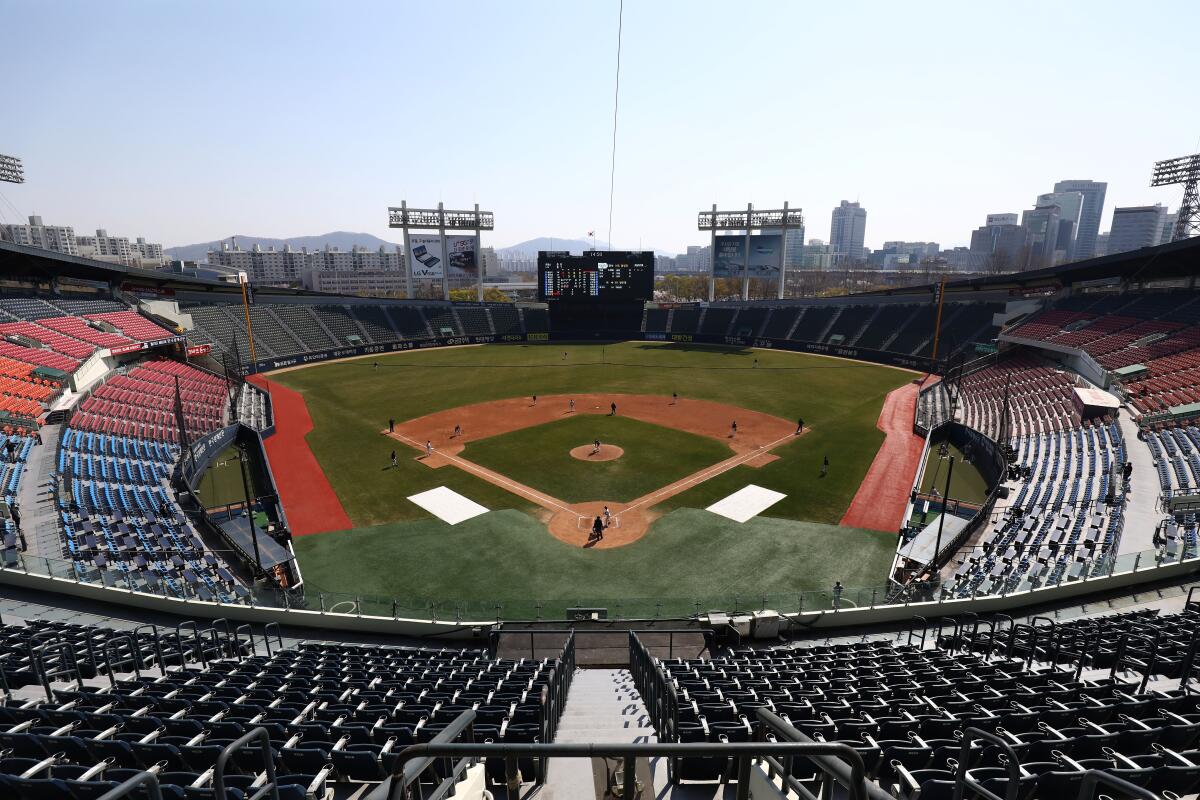
In the U.S., where testing is far less prevalent, the process would be more complex.
A league could gather all of its players, coaches and staff, testing everyone to ensure a virus-free community. Teams could live in designated hotels or dormitories, remaining isolated from the public, venturing outside only to practice and compete in sequestered ballparks.
Games could be televised to a home-bound nation eager for diversion. Top league executives believe ratings could reach levels not seen since the pre-digital era.
Major League Baseball officials have identified such a plan as “one potential option” for salvaging a season that was supposed to begin last month. They also added a disclaimer.
“The health and safety of our employees, players, fans and the public at large are paramount, and we are not ready at this time to endorse any particular format for staging games in light of the rapidly changing public health situation caused by the coronavirus,” MLB’s statement read.
In theory, the strategy could work if players adhered to extreme restrictions. In reality, health experts say, it represents a high-stakes gamble.
“Even professional athletes who test negative for COVID-19 with regular testing could be false positives and could get sick,” said Summer Johnson McGee, dean of the School of Health Sciences at the University of New Haven in Connecticut.
The risk is amplified by the nature of athletic competition. There is no room for social distancing amid constant physical contact in football and basketball. Baseball has its tradition of players spitting and managers arguing, nose-to-nose, with umpires.
“It’s not just the games,” Chang said. “Every practice is a high-risk transmission event.”
A look at athletes, coaches and others in the sports world who have tested positive of the coronavirus.
On a practical level, the Johns Hopkins doctor wonders about a player testing negative before kickoff, then showing symptoms of the virus the following morning.
“Technically,” he said, “all those people who played in the football game should be quarantined for 14 days.”
A single, undetected case of coronavirus could multiply into infections across the league.
“The potential of illness or even death among elite athletes is something that professional sports leagues should not risk,” McGee said.
Though people who are young and fit appear more likely to be asymptomatic or recover from COVID-19 without serious consequence, there is still potential danger. Research of the Spanish Flu of 1918 has shown that when a healthy immune system overreacts to infection, the resulting autoimmune disorders can be more harmful than the disease itself.
“Sometimes the most strapping people are the ones who have the strongest immune response,” said Jackson of UCLA. “It was immune response that killed so many people in 1918, not the virus.”
::
For all their concerns, experts see a couple of paths back to the playing field.
The development of a reliable treatment would make COVID-19 both less dangerous and less onerous to the healthcare system. Just as useful, extensive serologic testing could identify players who possess antibodies to fight off the virus.
“Professional athletes who have COVID-19 antibodies playing against other athletes with those antibodies would present zero risk,” McGee said. “This might limit rosters somewhat significantly, but at least games could resume for some teams.”
Such testing could also trigger what Chang calls “a perverse incentive.”
A player who has immunity would become more valuable to his team; a third-stringer could vault into the starting lineup by way of the required antibodies. He could develop those antibodies by surviving the disease.
“If I’m a player and I’m healthy, I might think about that,” Chang said. “I might say, ‘What the hell, let me get infected with coronavirus and I’ll be one of the privileged few.’”
A look at how sports leagues, including the NFL, MLB, MLS, NBA and NHL, are responding to the coronavirus outbreak.
The prospect frightens Jackson.
“The damage this virus does to the lungs is substantial,” he said. “You’re not going to be running a 9.5-second dash after having pneumonia from coronavirus.”
But the allure of sport, especially now, could prompt leagues to continue searching for a way back. The money involved — millions in player contracts, billions in broadcast rights — only boosts the incentive.
As a fan and a doctor, Chang understands the conflicting motivations.
“There is really no way you can have sports without increasing the risk,” he said. “But it may be that our society decides it’s a risk worth taking.”
More to Read
Go beyond the scoreboard
Get the latest on L.A.'s teams in the daily Sports Report newsletter.
You may occasionally receive promotional content from the Los Angeles Times.

